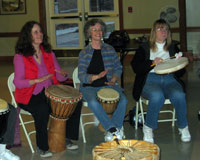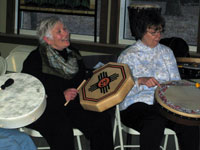Walking up to the doors of the Peoria Universalist Unitarian Church on March 16, already a rhythmic drumming could be heard; it thumped on like a heartbeat. A metal tinker could also be heard above the mix of drum sounds, following its own tempo.
Inside, 14 women—mostly central Illinois residents with one Indiana visitor—gathered in a circle of chairs and smiled as they participated in the interlocking rhythm which filled the large open room of the church. With legs crossed at their ankles to support their upright drums, each woman found her own rhythm by thumping her palms on a drum. “It’s not about being a musician or playing a complicated beat,” instructor Peggy Patty said after the beat died away. “The people we honor the most are providing the service of making sure the grounded beat is there. The hardest thing is not to speed up once the rhythm is achieved.”
The all-women drumming circle is called Drum Sisters and is a branch of Earthbeat, a Springfield drum circle started eight years ago by Springfield natives Peggy Patty, Phyllis Lau and Ramona Nafus. Nafus’ involvement ended abruptly after a car accident took her life in December 2003. In February, Patty and Lau made their way to central Illinois after receiving multiple requests to start a Peoria drum circle. Already, 14 loyal attendees—who range in age from mid-30s to mid-60s—attend the evening sessions held on the third Friday of each month.
“The ranges in age are huge. We had an 11-year-old girl up to (a woman) in her mid-80s. There’s no spiritual background and those run across the board from Unitarians to Catholics,” Lau said of the Springfield group. 
Patty and Lau developed in interest in drumming 20 years ago after attending various women’s festivals which included drumming, but it wasn’t until about nine years ago that the pair began actively playing the drums. For the past eight years, Lau and Patty have held drumming workshops which teach different rhythms, drum techniques and direct people to the different kinds of drums available. “Women tend to be more hesitant than men about doing new things. They think that if they can’t do it perfectly then they shouldn’t be doing it at all, especially…if they think people are going to judge them. I was that way,” Patty said. “I learned that with drumming as with many things in life, it’s about the experience of doing it, not if you’re doing it perfectly. With a drum circle it’s not performance drumming, there’s no need to be a musician to get into the rhythm. There’s all kinds of lessons to be learned at a drum circle.”
Around the world, people of various cultures create drums out of wood, clay, metal or even plastic and use them for communication, religious rituals and entertainment. “They’ve been a part of all different cultures since time,” Patty said of drums, specifically noting Native American cultures. “Drumming is in every spiritual tradition including Christianity—angels have their tambourines.” The drums used in most drum circles— including Drum Sisters—are not the typical set found in a rock band but are freestanding solitary pieces. Hand drums are commonly classified by their shape and most are categorized as: cylindrical, barrel, conga, waisted, goblet or bowl. The conga tapers at its bottom, and the waisted drum tapers in the middle. Some drums also have two heads at either end of the body. Most drummers decide early on whether they would rather hold the drum off the ground—to allow for complete reverberation and sound—or find one to cradle in an arm or lap. All drums have a certain tone that changes with their body shape and head size. Since drums are not “tuned” instruments, only stretching the head of the drum adjusts the pitch. However, different sounds can be created by applying the palm to the drum in different ways or using other musical instruments on the drum. These different drum sounds all blend together during a session and create a “conversation” with each woman’s rhythm speaking a different line.
“It’s group magic,” Patty said. “We start with a basic rhythm and add in their parts of the conversations of drums. Percussion adds to it to make the whole greater than the sum of its parts.”
Peoria resident Pam Greenslate brings her African and East India-style drum to the sessions. She cautions first-time drummers on buying a leather-headed drum because weather can easily change the sound since it warps the head. She suggests a synthetic drum if it is going to be carried in and out of the car. Greenslate was part of another local drum circle in 1996 that was first held in Eureka. The group moved to the Wildlife Prairie Park but eventually disbanded in 2005. “I think drumming is a really good way of de-stressing and relaxing,” Greenslate said. “The most amazing thing is whenever drumming starts in a freestyle—no one really wants to get into it, but as you play over time people get to loosen up. By the end of the evening people get very free and express body movement.”
Since many women spend a majority of their work time behind desks and computers, muscles can get very tense and tight. Drumming is also a way of relaxing from that controlled environment. “As we get older we need to exercise, especially our brains,” Patty said with a laugh. “(With drumming) you’re moving your hands and exercising your brain. In order to listen we have to relax and be part of the flow of the music—this is where the relaxation ad joy comes out of. We all need more fun in our lives.”
For MaryAnn Akers-Chamberlain, who calls herself a beginner to drumming, relaxation is just a wonderful byproduct of the activity. “I think that drumming is so universal that it appeals too many,” Akers-Chamberlain said. “I absolutely love it. I like the camaraderie and the motion and the energy.”
Since there are various kinds of drums which make different sounds, the hobby can be intimidating at first. But Drum Sisters offers a comfortable atmosphere where women can develop their own rhythm or follow the drum current every third Friday of the month at 7 p.m. at the Universalist Unitarian Church, 3000 W. Richwoods Blvd.
“Try it! Don’t come with any preconceived notion. Just come to learn and enjoy and perhaps rediscover who you are if you don’t already know,” Akers-Chamberlain said. tpw


